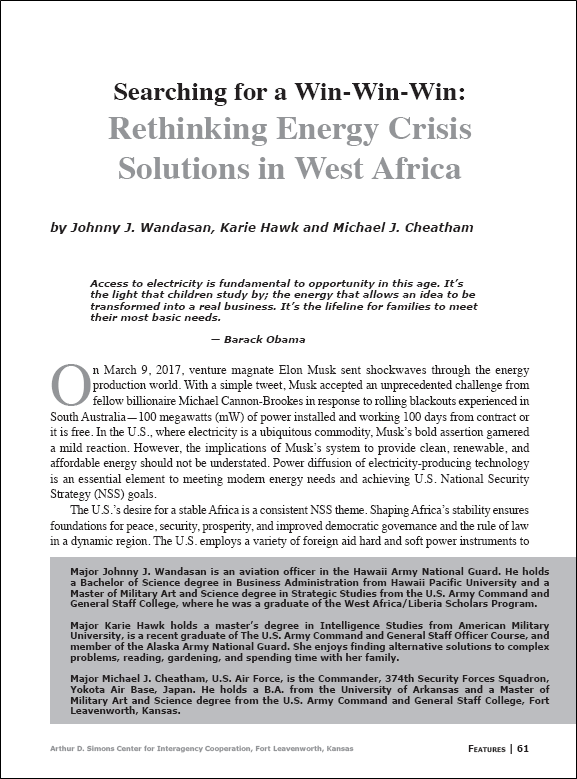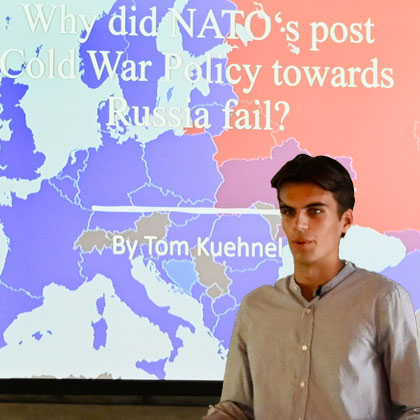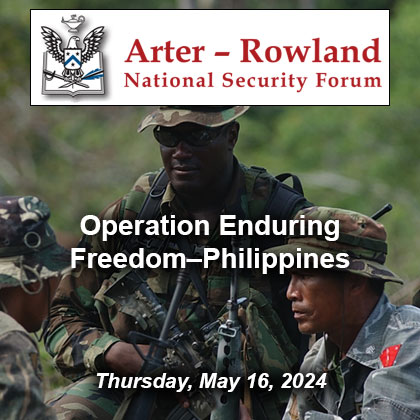Featured Article: Rethinking Energy Crisis Solutions in West Africa
Featured article:
Searching for a Win-Win-Win: Rethinking Energy Crisis Solutions in West Africa
by Johnny J. Wandasan, Karie Hawk and Michael J. Cheatham
On March 9, 2017, venture magnate Elon Musk sent shockwaves through the energy production world. With a simple tweet, Musk accepted an unprecedented challenge from fellow billionaire Michael Cannon-Brookes in response to rolling blackouts experienced in South Australia—100 megawatts (mW) of power installed and working 100 days from contract or it is free. In the U.S., where electricity is a ubiquitous commodity, Musk’s bold assertion garnered a mild reaction. However, the implications of Musk’s system to provide clean, renewable, and affordable energy should not be understated. Power diffusion of electricity-producing technology is an essential element to meeting modern energy needs and achieving U.S. National Security Strategy (NSS) goals.
The U.S.’s desire for a stable Africa is a consistent NSS theme. Shaping Africa’s stability ensures foundations for peace, security, prosperity, and improved democratic governance and the rule of law in a dynamic region. The U.S. employs a variety of foreign aid hard and soft power instruments to achieve its interests. In vulnerable regions within Africa, soft power—the ability to influence others to do what is in our interests without the use of “sticks” and “carrots” associated with traditional national instruments of power—is more advantageous to gaining and maintaining a positive U.S. narrative than traditional hard power. A prime example of innovative U.S. soft power in Africa is the Millennium Challenge Corporation’s (MCC) efforts to increase energy production in the West African nation Liberia.
The “Liberia Compact” is a $257 million, Liberia-focused, MCC-led effort designed to encourage economic growth and reduce poverty in Liberia through three separate but mutually-supportive goals…
Read the full article
Searching for a Win-Win-Win: Rethinking Energy Crisis Solutions in West Africa PDF
Download the complete edition
IAJ 9-1 (2018) PDF
IAJ 9-1 (2018) ePub
Major Johnny J. Wandasan is an aviation officer in the Hawaii Army National Guard. He holds a Bachelor of Science degree in Business Administration from Hawaii Pacific University and a Master of Military Art and Science degree in Strategic Studies from the U.S. Army Command and General Staff College, where he was a graduate of the West Africa/Liberia Scholars Program.
Major Karie Hawk holds a master’s degree in Intelligence Studies from American Military University, is a recent graduate of The U.S. Army Command and General Staff Officer Course, and member of the Alaska Army National Guard. She enjoys finding alternative solutions to complex problems, reading, gardening, and spending time with her family.
Major Michael J. Cheatham, U.S. Air Force, is the Commander, 374th Security Forces Squadron, Yokota Air Base, Japan. He holds a B.A. from the University of Arkansas and a Master of Military Art and Science degree from the U.S. Army Command and General Staff College, Fort Leavenworth, Kansas.

READ THE LATEST UPDATES FROM THE SIMONS CENTER
"*" indicates required fields


